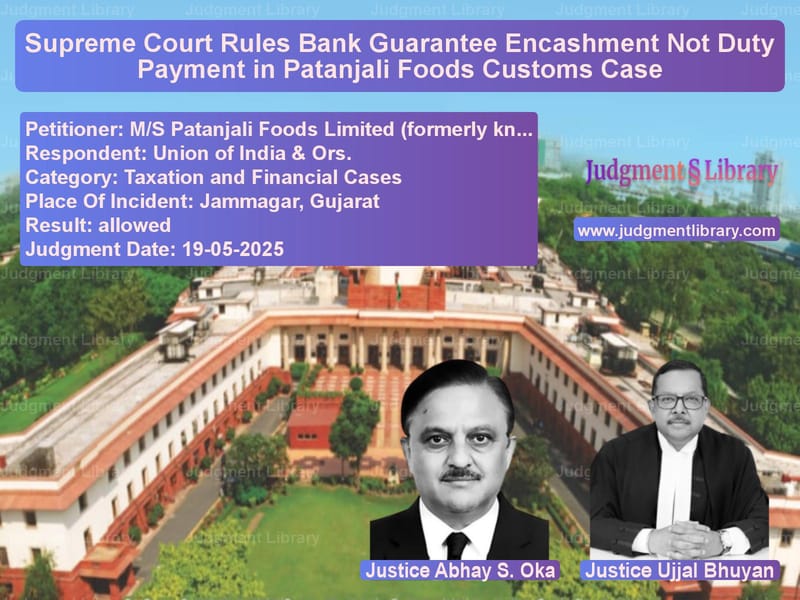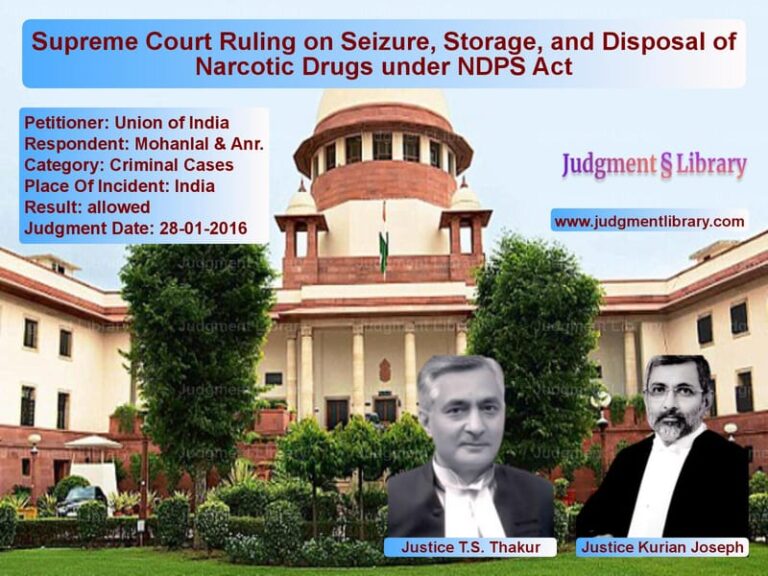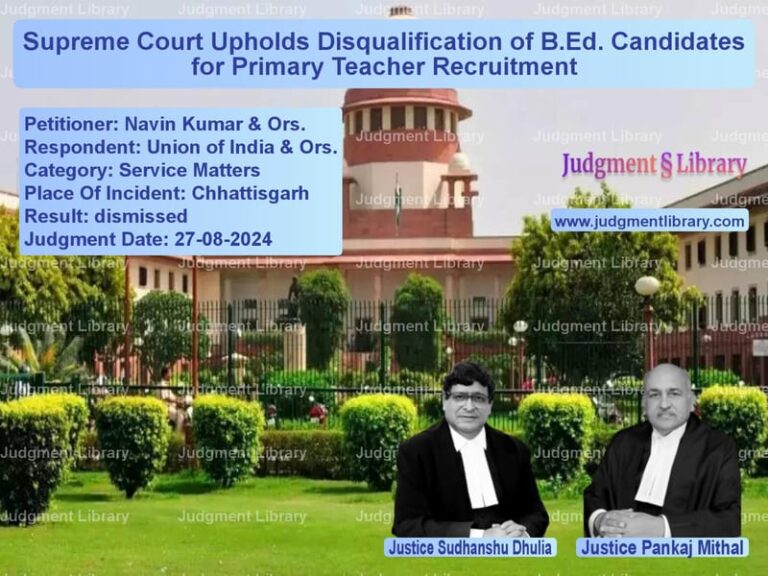Supreme Court Rules Bank Guarantee Encashment Not Duty Payment in Patanjali Foods Customs Case
In a landmark judgment that clarifies the legal distinction between payment of duty and encashment of bank guarantees, the Supreme Court has delivered a significant victory for Patanjali Foods Limited (formerly Ruchi Soya Industries Limited) in a long-standing customs duty dispute with the Union of India. The case, which spanned over two decades, centered around whether the forcible encashment of bank guarantees by customs authorities could be treated as ‘payment of duty’ under the Customs Act, 1962, and whether the doctrine of unjust enrichment would apply to such recoveries.
The legal battle began in 2002 when M.P. Glychem Industries Limited (which later merged with Ruchi Soya Industries Limited) imported crude degummed soyabean oil at Jammagar. The customs department insisted on charging higher duty based on a tariff value notification, while the company contended that the notification hadn’t come into effect at the time of import. To resolve the impasse and secure release of the goods, the company furnished bank guarantees totaling approximately Rs. 77.43 lakhs as security for the differential duty amount, following an interim order from the Gujarat High Court.
The case traveled through various judicial forums over the years. The High Court initially dismissed the company’s challenge in 2012, after which the customs department promptly encashed the bank guarantees in January 2013. However, the Supreme Court subsequently ruled in favor of the company in 2015 in the case of Union of India vs. Param Industries Limited, holding that the notification wasn’t legally enforceable since it wasn’t offered for sale by the Central Board of Excise and Customs when the goods were cleared.
When Patanjali Foods sought refund of the amounts collected through bank guarantee encashment, the customs authorities insisted that the company comply with Section 27 of the Customs Act and prove that it hadn’t passed on the duty burden to consumers – the doctrine of unjust enrichment. This led to the current round of litigation, with the company arguing that since no duty was actually ‘paid,’ the unjust enrichment principle didn’t apply.
The Legal Battle
Before the Supreme Court, Mr. Balbir Singh, learned senior counsel for Patanjali Foods, made compelling arguments that would ultimately shape the court’s decision. He vehemently argued that “encashment of bank guarantee cannot be equated with payment of duty as per language employed in Section 27 of the Customs Act.” This distinction formed the cornerstone of the company’s case.
Mr. Singh drew the court’s attention to established legal precedents, particularly the Oswal Agro Mills case, which had been endorsed by a Constitution Bench in Somaiya Organics (India) Ltd. vs. State of U.P. He emphasized that “the doctrine of unjust enrichment will not come into play when bank guarantee is offered as security and the same is encashed by the revenue after the case is lost by the assessee.” The senior counsel pointed out that “it cannot be said that assessee had paid the amount as duty; therefore, such encashment would be out of the scope of unjust enrichment.”
The counsel also highlighted what he characterized as improper conduct by the revenue authorities, noting that “respondents had acted in extreme haste while encashing the bank guarantees knowing fully well that the judgment of the High Court was under active consideration of this Court.” He argued that the authorities should have awaited the Supreme Court’s decision rather than precipitously encashing the guarantees.
Mr. Singh’s fundamental contention was that “stricto sensu, it is not a case of refund because no duty was ‘paid’ by the appellant. Section 27 of the Customs Act therefore would not be attracted.” This technical but crucial distinction would prove decisive in the case.
On the other side, Ms. Nisha Bagchi, learned senior counsel for the Union of India, defended the department’s position. She emphasized that “respondents were under no legal injunction not to encash the bank guarantees after dismissal of the writ petitions” by the High Court in 2012.
Ms. Bagchi argued that the company had failed to comply with procedural requirements, stating that “though the appellant had filed three refund applications on 04.06.2015, it did not attach any relevant document in support of the refund claims as required under Section 27 of the Customs Act.” She maintained that the department had acted within its rights in insisting on proper documentation.
The government counsel also revealed that despite the company’s non-cooperation, “respondent No. 3 sanctioned the refund in terms of Section 27 of the Customs Act but ordered for crediting the refund amounts to the Consumer Welfare Fund” due to non-compliance with unjust enrichment requirements. She concluded that “it is a case where appellant would be entitled to refund provided it satisfies the requirements under Section 27 of the Customs Act which it has failed to do.”
The Court’s Analysis
The Supreme Court bench comprising Justices Abhay S. Oka and Ujjal Bhuyan delivered a comprehensive judgment that extensively analyzed the legal principles governing bank guarantees, duty payment, and unjust enrichment.
The court began by examining Section 27 of the Customs Act, noting that “the key word in Section 27 of the Customs Act is ‘paid’. Refund thereunder is permissible only if any duty is ‘paid’ by the claimant which subsequently becomes refundable either fully or in part.” This interpretation became the foundation for their subsequent reasoning.
The justices then turned to the crucial question of whether encashment of bank guarantees could be considered as payment of duty. They extensively referenced the Oswal Agro Mills case, where the court had posed the question “as to whether it can be said that furnishing of a bank guarantee for all or part of the disputed excise duty pursuant to an order of the court is equivalent to payment of the amount of excise duty.” The earlier court had answered this in the negative, holding that “The amount of the disputed tax or duty that is secured by a bank guarantee cannot, therefore, be held to be paid to the revenue. There is no question of its refund and Section 11B is not attracted.”
The court also relied on the Constitution Bench decision in Somaiya Organics, which had approved the Oswal Agro Mills reasoning and held that “a bank guarantee which is furnished cannot be regarded as payment of excise levy which the Government is entitled to retain.” The Constitution Bench had eloquently stated that “Furnishing of bank guarantee is only a promise by the bank to pay to the beneficiary the amount under certain circumstances contained in the bank guarantee. Furnishing of bank guarantee cannot tantamount to making of payment.”
The court made a clear distinction between the current case and the DCW Limited case that the High Court had relied upon. In DCW Limited, the court had permitted revenue to encash bank guarantees after vacating stay orders due to the applicant’s persistent default in paying duty. The bench pointed out that “Insofar the present case is concerned… there was no direction either or leave granted by the High Court to the respondents to encash the bank guarantees furnished by the appellant on orders of the High Court covering the differential amount of duty.”
The court strongly criticized the revenue department’s conduct, observing that “Without waiting for this Court to take a decision in Civil Appeal Nos. 1808-1813 of 2013, revenue displayed extreme haste and encashed the bank guarantees.” This haste proved significant in the court’s assessment of the situation.
The Final Ruling
In its conclusive analysis, the Supreme Court held that “encashment of bank guarantees offered as security cannot be treated as payment of customs duty.” The court emphasized that “respondents could have either awaited the decision of this Court or could have directed the appellant to renew the bank guarantees. This they did not do. Instead they resorted to arbitrary encashment of the bank guarantees.”
The court definitively stated that “Such encashment of bank guarantees cannot be treated as payment of duty or duty paid by a claimant. In such circumstances, the doctrine of unjust enrichment or Section 27 of the Customs Act would not be applicable.”
In their final ruling, the justices declared that “It is evidently clear that respondents are holding on to money of the appellant which they are not authorized to do so as per judgment of this Court in Param Industries Limited (supra). They have no authority in law to hold on to such money and, therefore, the same has become totally untenable.”
The court allowed the appeals and directed that “respondents to immediately refund the amounts covered by the bank guarantees to the appellant.” Recognizing the injustice of the prolonged retention, the court also ordered that “Since retention of such amounts is unjust and unlawful, the same would carry interest at the rate of 6 percent from the dates of encashment till repayment.” The repayment with applicable interest was directed to be made within four months.
Broader Implications
This judgment has significant implications for customs and excise litigation across India. It establishes a clear legal principle that bank guarantees furnished as security pursuant to court orders cannot be equated with payment of duty for the purpose of refund claims. The ruling reinforces the procedural safeguards that protect assessees from arbitrary recovery actions by tax authorities.
The decision also serves as a reminder to revenue authorities to exercise restraint and follow due process, even when they believe they have the upper hand in litigation. The court’s criticism of the “extreme haste” displayed by the customs department in encashing the bank guarantees sends a strong message about expected standards of conduct.
For businesses engaged in import-export activities, this judgment provides important clarity on their rights and remedies when disputes arise over duty payments. The distinction between actual duty payment and security enforcement could prove crucial in many similar cases where bank guarantees have been provided during pending litigation.
The Supreme Court’s firm stance on requiring the revenue department to pay interest on wrongfully retained amounts also establishes an important deterrent against unnecessary delays in refunding amounts that have been legally determined to be payable to assessees.
This judgment represents a significant development in Indian customs law, providing much-needed clarity on the legal treatment of bank guarantees in duty disputes and reinforcing the principles of natural justice in tax administration.
Petitioner Name: M/S Patanjali Foods Limited (formerly known as M/S Ruchi Soya Industries Ltd.).Respondent Name: Union of India & Ors..Judgment By: Justice Abhay S. Oka, Justice Ujjal Bhuyan.Place Of Incident: Jammagar, Gujarat.Judgment Date: 19-05-2025.Result: allowed.
Don’t miss out on the full details! Download the complete judgment in PDF format below and gain valuable insights instantly!
Download Judgment: ms-patanjali-foods-vs-union-of-india-&-ors-supreme-court-of-india-judgment-dated-19-05-2025.pdf
Directly Download Judgment: Directly download this Judgment
See all petitions in Customs and Excise
See all petitions in Tax Refund Disputes
See all petitions in Judgment by Abhay S. Oka
See all petitions in Judgment by Ujjal Bhuyan
See all petitions in allowed
See all petitions in supreme court of India judgments May 2025
See all petitions in 2025 judgments
See all posts in Taxation and Financial Cases Category
See all allowed petitions in Taxation and Financial Cases Category
See all Dismissed petitions in Taxation and Financial Cases Category
See all partially allowed petitions in Taxation and Financial Cases Category







